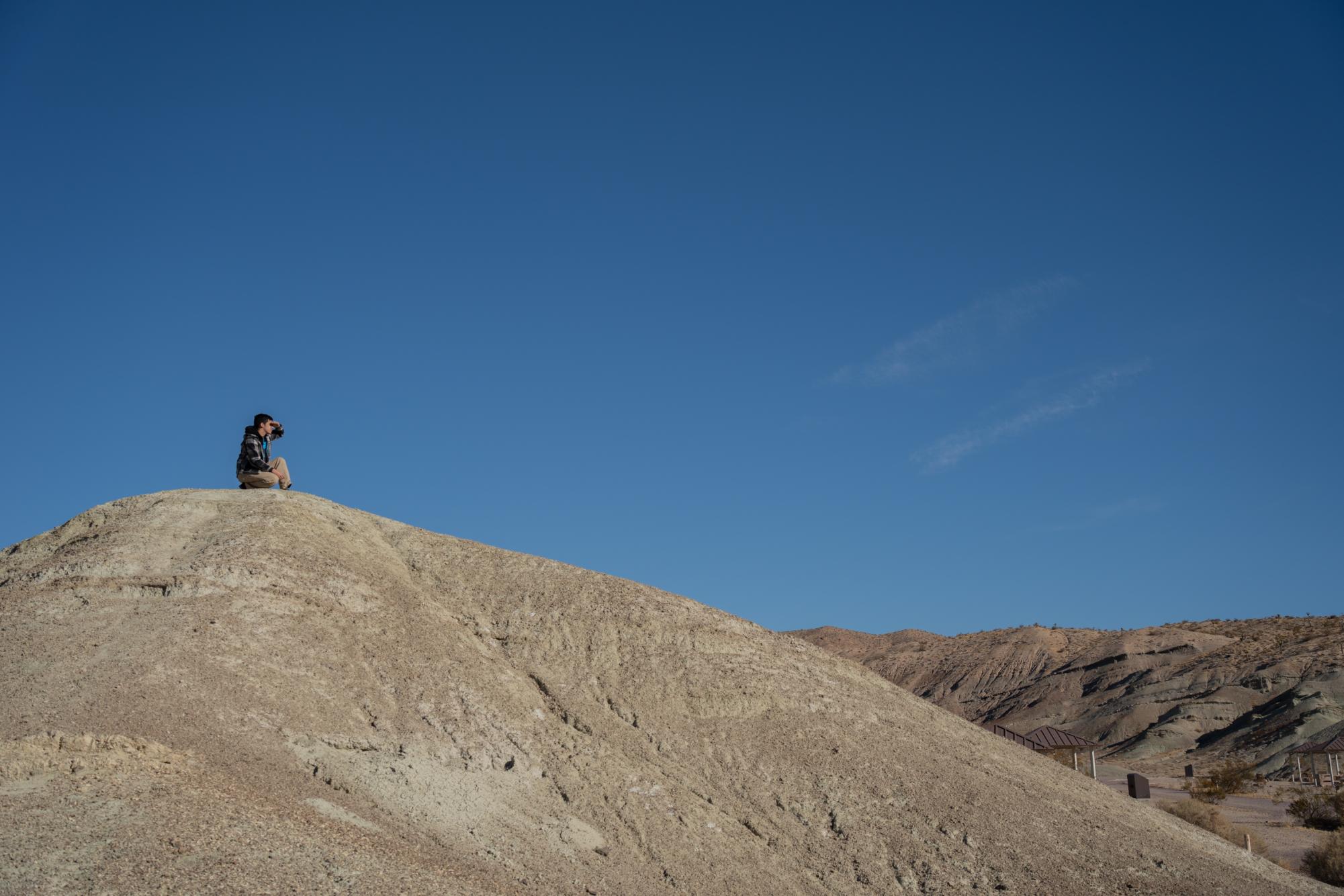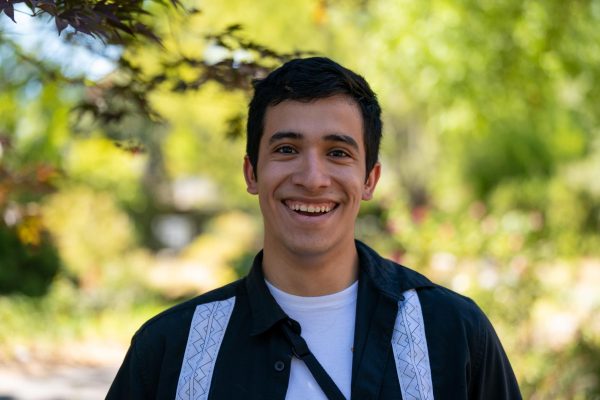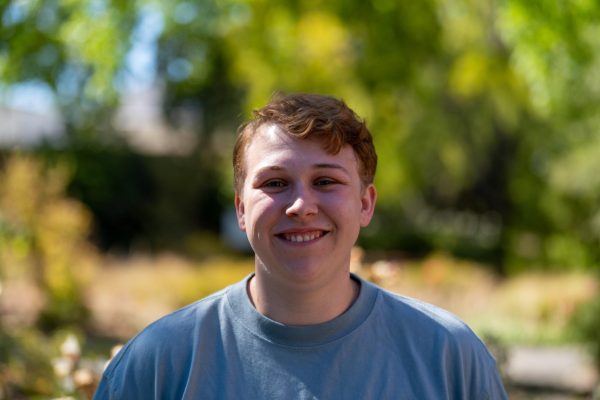The Mojave stretches before me, shimmering under a sky too blue to feel real. The cool air clings to my skin, the wind cutting deep into my bones sending a chill up my spine.
This isn’t the blazing desert I imagined; this is something colder, harsher, a reminder that desperation doesn’t always burn—sometimes, it freezes.
I’m here, chasing a promise older than California, and here in the howling wind I can hear it … the seductive whisper of gold.
Before I can wrap up my final semester at Santa Rosa Junior College I have to address my bill. To get the post-meal mint that is my Journalism A.A., I need to finally pay the school for the classes I’ve taken.
College debt? Soul-crushing. Campus job postings? Sketchier than a windowless van advertising “Free Candy.” But gold? Gold feels honest. Or at least it did.
With this looming threat, I had an entrepreneurial epiphany.
Wine moms have multi-level marketing schemes. The financially illiterate have crypto scams. What do struggling college students have? Internships and opportunities for “great exposure.”
We live in an era where you can buy your way into the Oval Office with enough money. Elbow grease and gumption are great, and motivation and moxie are marvelous, but all that truly matters to society is what color your American Express card is.
Not many college students are born to billionaire fathers, but luckily for us Californians, we’ve inherited the greatest get-rich-quick scheme known to man: the Gold Rush.
Sure, bills might have brought me out here, but this wasn’t just about money. Gold represents something more—status. Wars have been fought over it, empires toppled and lives sacrificed in pursuit of it.
Today, we drape ourselves in gold like peacocks in heat, flashing necklaces, rings and watches that scream, “Look at me, I’m worth more than your rent.” Gold is the ultimate shiny, overpriced middle finger to everyone around us.
It brings its own delusions of grandeur. Take Samuel Brannan, for example. Considered the first to have publicized the Gold Rush, he became California’s first millionaire, not from mining gold, but by selling supplies to miners. Brannan’s wealth made him the richest man in the state for a time, even allowing him to stage a failed coup against a Hawaiian king.
This level of unhinged ambition is exactly what I aspired to achieve in my mission for gold.
I refused to brave the badlands alone so I called in reinforcements: Oak Leaf Reporter Elliott Kennedy, a walking tank of a man whose broad shoulders could shield me from whatever the desert had in store. Together, we were a duo built for adventure—one all brawn, the other with the physique of a spider-monkey.
We set off in Elliott’s Toyota Rav4 to the Mojave in search of fortune.
My journey didn’t begin in the desolate expanse. It began in the Bay Area in a sea of brake lights stretching endlessly ahead. The plan to get rich quick was first put on the back burner as my only desire in traffic was to escape the city.
San Francisco isn’t just a city—it’s Ayn Rand’s wet dream. The housing prices rise like an unrelenting tidal wave, slowly crushing anyone with stock options or a trust fund, forcing those who can’t afford it to scatter like mice.
As I inched forward, San Francisco seemed to taunt me: If I failed to find my fortune I’d barely be able to afford a studio with six roommates in a place like this. Being stuck in traffic seemed like a metaphor for places like San Francisco, a reminder that if you aren’t rolling in cash, you aren’t rolling at all.
After a partial eternity, the traffic broke and the city faded from my mind like a nightmare. All that lay before me was a seven-hour drive on California’s most boring paved road, Interstate 5.
If patience is a virtue, those who commit to the drive south are venerable saints.
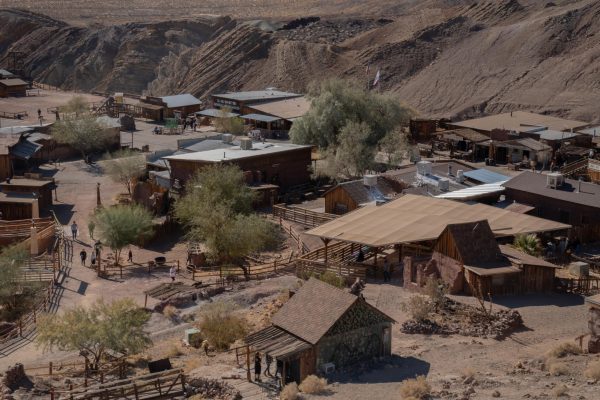
My destination was Calico, a ghost town, squatting just outside of Barstow in the southern Mojave Desert, Calico. Once a booming silver-mining town in the 1880s, Calico now survives as a gaudy tourist attraction clinging to the memory of its glory days.
While the town’s heyday was built on silver, notably not gold, I figured the principles to learn were roughly the same: dig deep, have luck and rely on underpaid minorities to do the majority of the work. In my case, I could have convinced more college students to join with the promise of this being a resume builder.
By the mid-1880s Calico was the place to be, if you were interested in silver mining, with 500 mines and a population of 1,200 the town was the largest silver producer in the state.
But their choice of going after the inferior metal proved to be the town’s downfall. While gold prices rose, the value of silver plummeted resulting in the town’s failure.
The town’s rise and fall mirrored my own as I approached Southern California. What if the meager mound of shiny silver I could strive to muster couldn’t ding a dent in my debt? I could at least use that silver to make myself a second-place trophy in the race to nowhere.
I found encouragement upon learning that after the town became defunct, it rose again, like a phoenix with a price tag. Walter Knott, of Knott’s Berry Farm fame, used his wealth to restore the abandoned town. Another shining example of how wealth can erase consequences.
Knott didn’t just have enough cash to buy the town — he engaged in the ultimate rich guy move and ditched it, handing over the restored town to San Bernardino County. This is the kind of “fuck you” money I sought.
I left Barstow, and before I could even spot the first Joshua tree, those strange, spiky, almost alien-looking things, the sun had already called it quits for the day. On the last stretch of the journey to Calico, I found myself surrounded by Joshua trees. With their gnarly limbs and awkward stance they stuck out like sore thumbs amidst the smooth stillness of the desert, like the Mojave’s eccentric, punk-rock guardians. I couldn’t tell if they approved of me or not.
By the time I arrived at Calico, the warmth of the sun had abandoned me, and the gates were locked, leaving me with nothing but the cold and a whole lot of desert silence until morning.
I found refuge at Owl Canyon Campground, a dusty Bureau of Land Management site. The site’s bathrooms and singular water spigot were like a still frame among the freezing night. The gears in my head were succumbing to the cold as I couldn’t settle on where to set up camp.
Each campsite seemed more unwelcoming than the last until I reached lucky No. 4, my Zion. Without a second to waste, I insulted every Eagle Scout by throwing sticks in the fire pit and dowsing them in lighter fluid. The fire started in an instant. Any prospector would have done the same given the option.
Looking across the moonlit landscape, the vastness hit me like a punch in the gut. The fortune could be anywhere and there was even a possibility that it could be nowhere. But that was tomorrow’s existential crisis. Tonight my only concern was to get these canned beans cooked.
As the beans simmered in the lighter-fluid fire, two shiny, opportunistic eyes watched me from just beyond the fire’s edge.
A bold field mouse sprung into a mad dash to get just close enough to further examine the source of the aromas that had brought it to my campsite. When I took note, the mouse would bolt with adrenaline-fueled speed to avoid my gaze and return to the security of the darkness.
I’ve read my fair share of children’s books, and I know how these situations work. The creature’s beady little eyes were fixated on my food, but there was a price to join this feast. As the mouse crept toward me barely illuminated by the fire, as still as I could be, I presented it with an offer.
The bargain was simple: For a bite of beans, it would lead me to gold. The mouse, most likely a communist, refused to participate in my attempt at a trade.
It was foolish of me to think that I was special, like some chosen one destined for a direct handshake with fortune. I briefly entertained the idea that there was some deeper meaning to this encounter, a grand lesson to be learned. No, this was just a distraction from my grand plan.
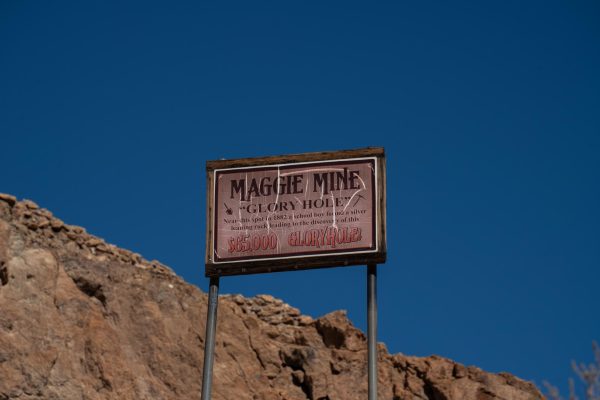
I ate and as the fire gave way, the night crept in — forcing me to retreat to the car for warmth. I drifted off, wrapped in blankets and slightly covered in dirt, dreaming of deep veins of gold and silver.
I was woken by the bright blue morning sky with the golden sun hanging slightly over the horizon. I finally saw the Mojave in daylight and it was daunting. Stretching as far as the eye could see my vision only being broken by slight hills or the occasional boulder. Mountains barely visible functioned as a pseudo backdrop to the seas of shrubs and Joshua trees.
I found myself sinking into the beauty of the repeating landscape. Was I falling for the charm of absolutely nothing? The stillness, like a painting, cleared my mind. Why was I here? I felt compelled to sit down and take it all in for a second.
No, I snapped out of the desert’s spell — greed gave me the clarity I needed to break away from the desert’s beauty. After all, I’d come here to admire precious metal, not the scenery.
As I shook off the mesmerizing trance of the Mojave and entered Calico, the ghost town initially seemed ripped from the late 1800s. But once you walk through the entrance, the entire facade quickly gives away. Extension cords running from building to building ruined the facade.
The dusty roads, the old-timey buildings, and the employees speaking in Southern drawls gave a taste of something historic. But as you take it all in you quickly realize this is a replica. A carefully curated copy created to pull you in, but falling short of the real thing.
The stores, which make up the majority of the buildings, mainly sell throw-away chachkies relating to the Wild West or Route 66. Stores like the Leatherworks shop and General Stores contain a fair share of quality items, but still, all of this is meant to scratch the consumerist itch of tourists.
The history of the mining town was nearly stripped away. At every turn, there were only opportunities to spend wealth, not accumulate it. The price tags affixed to everything made me realize how much I had spent so far on this entire journey.
Gas, food and time were all costs I had gladly paid in search of wealth, but now in Calico, it felt like I was just spending money, not making any. The pursuit of gold was starting to feel like a cycle of empty transactions. I didn’t need overpriced water and Route 66 shot glasses, I was in search of knowledge from original prospectors.
I was directed to the original house of former resident Lucy Lane. The house is adorned with antiques meant to replicate what it would have looked like. Lucy Lane lived in Calico during its heyday, but even while walking through her original house she seemed to be an afterthought compared to the prospect of riches.
Lucy was just an average person, who happened to live in Calico before it was abandoned. Now her entire home and her memory had been reduced to a photo opportunity for tourists to upload 1800s oddities to their Instagram.
Would I too end up an afterthought, without the wealth to buy a town how will I be remembered in the history books?
The museums and stores didn’t give me the information I needed to ditch the park and venture into the shrublands with the confidence that I needed. So I opted for the tour of the Maggie Mine, which I still had to pay for.
Filled with a team of mannequin miners long dead, the mine tour only made me realize that my one-man operation was drastically understaffed. My morale plummeted. But the static-saturated pre-recorded tour message renewed my hope with the story of a child who discovered a chunk of silver on the mountain.
This child had come across a silver deposit just above the mine. His discovery had kick-started the Maggie Mine and led to a bunch of men risking their lives in the shafts. If a child could stumble upon a silver deposit, then what was stopping anyone else? With a bit of luck and the right kind of recklessness, riches could be hiding just beneath the surface, waiting to be claimed.
With newfound inspiration, we were ready to brave the Mojave. But before leaving, fate brought me my greatest teacher on top of a hill overlooking the town.
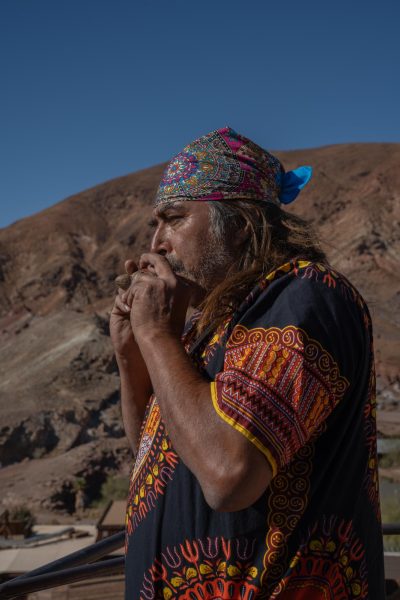
Arturo Chaves, a Mexican man holding a Native American walking stick, wearing an African dashiki, and playing a Mayan ocarina, stood at the hill peak, the wind carrying his melody across the park.
Arturo was a self-proclaimed hippie. He lived to adventure the globe, having visited over 50 countries, he was more than well-traveled.
“Everywhere I go I bring my ocarina, a flute and I’m normally dressed like this,” Arturo said. “I go wherever feels right and [when] I play people stop, taking photos or videos, thinking I’m some kind of weirdo, but I’m just trying to enjoy myself.”
Arturo has a normal job back home two hours south of Barstow, but he has spent his whole life adventuring. Back when he lived in Mexico, Arturo backpacked across the country with a friend named Juan. Sometimes with no money to their name the natural beauty they witnessed carried them forward.
Before me stood someone who lived in stark contrast to the purpose of my journey, and I envied him. I couldn’t truly understand his effortless indifference. He didn’t care if people laughed at him or how he dressed—and somehow, that made him untouchable.
He had broken from money’s grasp of money and no longer chased it.
He traveled for the sake of traveling and played the ocarina not for others but for nature itself. Where I saw potential for gold he looked out across the rolling dunes and saw something foreign to me, something I wished I could behold, but I wasn’t ready yet.
Arturo serenaded me with his ocarina, and before I departed he explained that he was traveling with his son’s father-in-law, a very plain-looking white man. Catching sight of his traveling partner, Arturo raised his walking stick into the sky and requested that the “wind spirits” guide both of our journeys.
Through his laughter, Arturo said, “I bet [my son’s father-in-law] hated that, people are going to think that I’m crazy.”
I departed my spiritual teacher and made for the shrublands of the Mojave to finally begin looking for gold.
By midday I found myself bracing the desert’s scrubby landscape. Only the occasional boulder broke the endless plain, jutting out from the sea of shrubs.
Every hole I dug produced only dirt, and every rock I examined produced no signs of precious metal. I turned to searching caves in hopes that some prospector’s sloth led to them leaving me a nugget. Nothing, but the desert’s still siren song, tempting me to forget my mission and lose myself in its quiet beauty.
I continued on. Every stop brought me further into the desert and further into despair. I was losing daylight and patience as I covered more and more land.
The road faded from view and the thought of actually finding anything of value began to drift away as well.
As the sun set the wind howled in the valley I found myself in. My enthusiasm wilted like much of the desert vegetation. I hadn’t found gold, silver or even a can to take to the recycling plant.
I watched the sunset from on top of a nearby hill in reflective silence.
Was all of this for naught? Was I about to join the long list of losers who’d failed to find anything?
The wind howled around me. I thought back to my spiritual guide, Arturo, and what sage advice he would have provided me at that moment. I stopped for a second just as he does when he plays his ocarina and just stood there.
For the first time in what felt like forever, I stopped and could feel the desert spell begin to wash over me yet again, but this time I thought of Arturo. I thought of how he didn’t fight the call of nature but followed it.
I stayed there accepting the desert’s beauty for the first time and listened. Not to the sound of Arturo’s ocarina, but to the desert’s gentle song. The silence only being broken but the gentle rustle of the shrubs as the wind gracefully passed. My mind was cleared of greed.
I stopped thinking about the bill waiting for me back at SRJC. I stopped obsessing over the numbers in my bank account, or lack thereof, and the crushing pressure to figure it all out. At that moment none of it mattered.
That doesn’t mean money doesn’t matter—it does. It always does, especially for those of us clawing our way through education, trying to build something resembling a future. And I know there are people out there in far worse situations, trapped under the weight of debts and hardships I can’t even begin to imagine.
But for a moment, the desert taught me something: Money shouldn’t consume us.
We live in a culture where most of us are defined by our ability to show off wealth. We are told by influencers that money can solve all our problems. People all around us are willing to ditch their morals to earn millions.
Out in the desert, it doesn’t matter.
The Mojave doesn’t care about credit scores or overdue tuition. Its beauty lies in its indifference, its refusal to be anything other than what it is. It simply exists, vast and wild, asking nothing but that we take a moment to see it.
I sat on a sun-bleached rock and let the silence settle over me. For the first time in weeks, I didn’t feel the knot of stress tightening in my chest. Instead, I felt at peace for just a moment. Out among the titillated tarantulas and the hungry field mice, none of my monetary woes mattered.
Yes, money matters. Yes, we live in a world where financial struggles can shape every decision we make. But maybe the trick is learning when to let go, even for just a moment. Step back, breathe in the dry, sage-scented air and remember there’s more to life than what’s in your wallet.
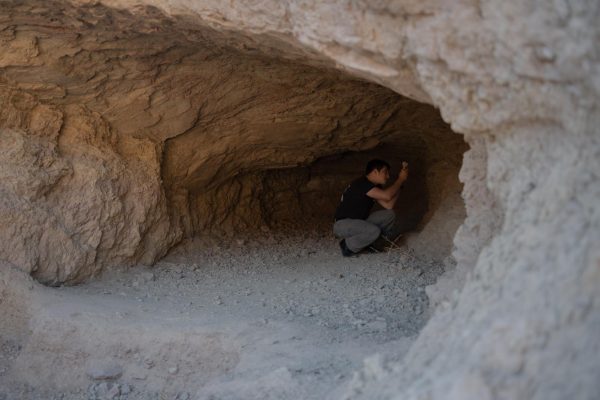
I left the Mojave with no fortune to show for my efforts, but I left with something else. A lesson, maybe, or just a stark reminder: Greed isn’t the answer. Chasing wealth, whether it’s in the dirt or a bank account, blinded me to what mattered. Sometimes the best thing you can find isn’t gold; it’s the clarity to know when to stop digging.
Back home, the unpaid bill at Santa Rosa Junior College still waits for me. I was over 150 years too late to take advantage of the Gold Rush. The Mojave didn’t give me riches, but it gave me perspective and for now, that feels like enough.
If you feel burnt out by the hustle, take a break and journey out into the Mojave. It doesn’t care about luxurious items or the newest tech. Out in the vast nothing, the only thing that matters is your ability to enjoy it.
A Man with No Name once said, “There’s two kinds of people, my friend: Those with loaded guns and those who dig. You dig.” For this entire trip, I was the one who dug, convinced that every scoop would unearth a pile of gold, or at least something shiny enough to impress my bank account.
I was being driven by greed, chasing wealth like I would be gunned down if I refused to stop. It never really made sense. I had traded in my free will for the chance to strike it rich, all the while I feared the desert’s allure as though it was trying to control me. Standing in the middle of nowhere, with my pockets as empty as the desert around me, I was free.
I had spent the entire day digging for treasure only to realize the real gem was the peace that came to me when I finally walked away.
No treasure, no problem. I was free, and I had zero gold to carry around, which felt pretty good.




